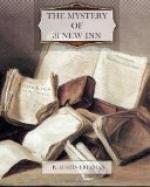Again he paused, as though expecting some remark from his listeners; but no one spoke, and he continued:
“Then there is this bottle with the theatrical wig-maker’s label on it, which once contained cement such as is used for fixing on false beards, moustaches or eyebrows.”
He paused once more and looked round expectantly at his audience, none of whom, however, volunteered any remark.
“Do none of these objects that I have described and shown you, seem to have any significance for us?” he asked, in a tone of some surprise.
“They convey nothing to me,” said Mr. Marchmont, glancing at his partner, who shook his head like a restive horse.
“Nor to you, Mr. Stephen?”
“No,” replied Stephen. “Under the existing circumstances they convey no reasonable suggestion to me.”
Thorndyke hesitated as if he were half inclined to say something more; then, with a slight shrug, he turned over his notes and resumed:
“The next group of new facts is concerned with the signatures of the recent cheques. We have photographed them and placed them together for the purpose of comparison and analysis.”
“I am not prepared to question the signatures.” said Winwood. “We have had a highly expert opinion, which would override ours in a court of law even if we differed from it; which I think we do not.”
“Yes,” said Marchmont; “that is so. I think we must accept the signatures, especially as that of the will has been proved, beyond any question” to be authentic.”
“Very well,” agreed Thorndyke; “we will pass over the signatures. Then we have some further evidence in regard to the spectacles, which serves to verify our conclusions respecting them.”
“Perhaps,” said Marchmont, “we might pass over that, too, as we do not seem to have reached any conclusions.”
“As you please,” said Thorndyke. “It is important, but we can reserve it for verification. The next item will interest you more, I think. It is the signed and witnessed statement of Samuel Wilkins, the driver of the cab in which the deceased came home to the inn on the evening of his death.”
My colleague was right. An actual document, signed by a tangible witness, who could be put in the box and sworn, brought both lawyers to a state of attention; and when Thorndyke read out the cabman’s evidence, their attention soon quickened into undisguised astonishment.
“But this is a most mysterious affair,” exclaimed Marchmont. “Who could this woman have been, and what could she have been doing in Jeffrey’s chambers at this time? Can you throw any light on it, Mr. Stephen?”
“No, indeed I can’t,” replied Stephen. “It is a complete mystery to me. My uncle Jeffrey was a confirmed old bachelor, and, although he did not dislike women, he was far from partial to their society, wrapped up as he was in his favourite studies. To the best of my belief, he had not a single female friend. He was not on intimate terms even with his sister, Mrs. Wilson.”




